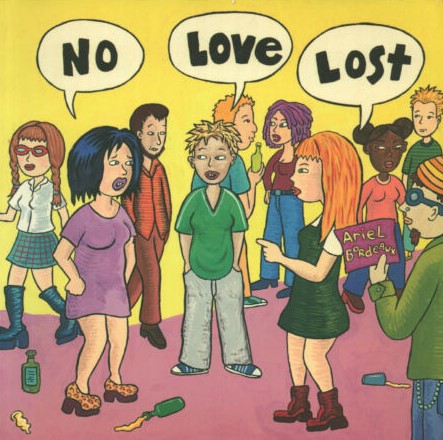
Ariel Bordeaux is a short form indie cartoonist that was one of the predominant female voices in comic zines in the 1990s. Her raw, authentic voice, along with her unapologetic female perspective, made her a unique talent when she first hit the scene. It was for this reason that I chose her to be my thesis advisor at the Center For Cartoon Studies. I found her work spoke to me in a way that almost no other comics do, even with the rise of female voices in the indie comic scene. She is also an alum of the Center For Cartoon Studies, and her thesis has all of the great qualities of her previous work, but was created by a more mature and wise cartoonist. In my opinion, her newer work is more powerful than her comics of the 1990s (it’s certainly more polished). However, her work is inaccessible to virtually any new readership (besides the snippets on her website) because her older work is out of print and her newer work hasn’t been taken seriously by her previous publishers.
She is a true talent whose work deserves a wider audience.
Anna Sellheim: What got you started on making comics?
Ariel Bordeaux: I was doing some sort of comics-related work in art school – I went to the Museum School in Boston – and had a strong interest in comics, but there weren’t any illustration classes. I tried a lot of different things, like jewelry and ceramics. I had a real aha moment in a ceramics class when I got an assignment to do a weekly diary in ceramics form, and also did an animated short which was where I started playing with a cartoony drawing style. I made my first mincomic maybe about a year or so after graduating.
Anna Sellheim: Ah yes, a dissatisfied art student getting into comics, a tale as old as time.
Ariel Bordeaux: Haha, yup.
Anna Sellheim: You became one of the “it” girls in 90s mini comics. How quickly did you find an audience, and where did most people discover your work?
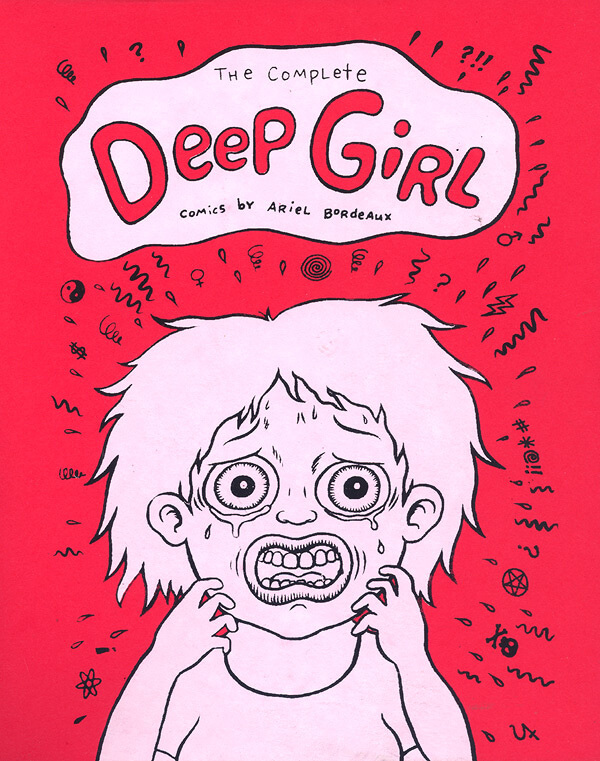
Ariel Bordeaux: As soon as Deep Girl got mentioned in a couple minicomics and publications like Optic Nerve by Adrian Tomine, and Factsheet Five, the famous review zine, I started getting orders. I moved from Boston to San Francisco between the first and second issue, and quickly started meeting people in comics. It seemed like the audience happened pretty quickly after that.
Anna Sellheim: We’ve talked previously about this, but it felt like you were automatically compared to and lumped in with other female comickers purely because of gender.
Ariel Bordeaux: Yes, mostly my close contemporaries like Megan Kelso and Jessica Abel. People would also mention Julie Doucet, Lynda Barry and Aline Kominsky-Crumb, all artists I admire.
Anna Sellheim: Did that cause any resentment or frustration? How did it affect you?
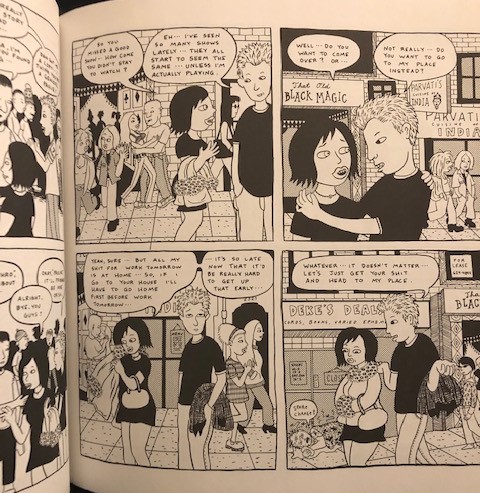
Ariel Bordeaux: Well, at first no, but over time I started to realize that the content of my comics took a back seat to my gender, and I was sometimes frustrated by that. Talking with other cartoonists in person – sometimes I’d get comments like, “oh, you look a little like Julie Doucet”. In reviews I think I was likened to a poor man’s Julie Doucet, which I wouldn’t have really questioned at the time, but now I wonder, were there any male artists with a crude, expressionistic style that could have come into some into those comparisons?
Anna Sellheim: The comparing looks thing really reveals how those people viewed women cartoonists as a novelty.
Ariel Bordeaux: Yes, very much so. I would have taken a comment like that as a big compliment at the time, but at the same time the constant comparisons to exclusively female artists kind of wore on me. The thing that got under my skin was that I felt like I was being pushed into a kind of competition I didn’t sign up for. This might be hard to imagine for younger artists coming into the comics scene now, but at the time it felt like there was only room for a tiny handful of women. I remember a male colleague at the time saying something in an interview, like, “Julie Doucet is the only woman artist who’s any good”. The comics industry is not perfect, but it’s so much more gender balanced and diverse now. Anyway, I’m sure I played into that and engaged in petty competition in some ways, but it was something I was constantly trying to work on, I didn’t want to feed into that.
Anna Sellheim: While you’re both female cartoonists doing autobio in a visceral art style, your stories are so different. Julie Doucet tells cool stories about what adventures she is having in a very punk rock way. You vomit your soul onto a page. Her work is about external events, your work is about your feelings and insecurities about things that happened to you.
Ariel Bordeaux: Right, my training and background at home and in art school was all about feelings. I guess I just had an urgent need to communicate my internal life – to be seen and heard.
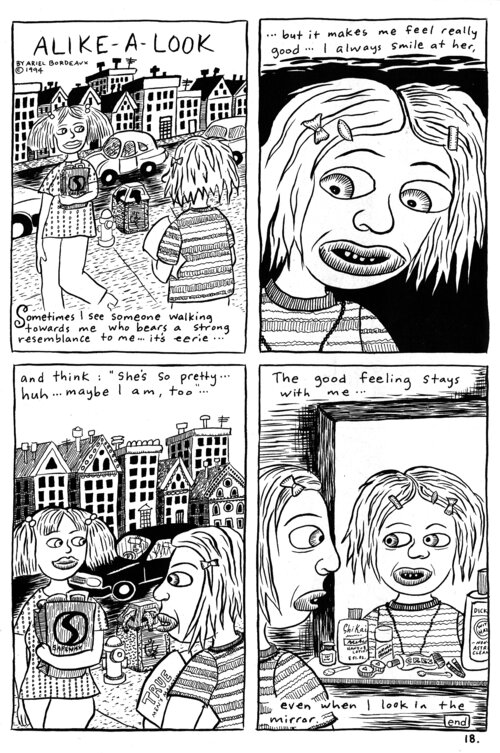
Anna Sellheim: So this has me asking two questions at once — first, part of the reason I fell in love with your work in middle school was because your vulnerability and fundamentally female perspective that shows up in your work spoke to me. So I’m not sure that a man could come up with similar stuff. Especially the way you portrayed yourself in your autobio work. You are a very beautiful woman that drew yourself like a crazy monster. Can you talk about the way you drew yourself then and how it’s changed over time?
Ariel Bordeaux: The crazy monster style came out of my Museum School work, which was mostly not autobio, but I was especially fascinated with indigenous and tribal cultures and took a lot of early art history courses. I’ll have to admit to a bit of cultural appropriation, which I think was just par for the course in art school until recently. Over the years, a combination of wanting to adapt a cuter more appealing style dovetailed with developing a more positive self-image. As to the first part of your question, it’s true, I’m very much a ‘woman’s woman cartoonist’.
Anna Sellheim: Definitely. The comic that got me to buy all of your work in middle school was the cover to issue 4 of Deep Girl where the hot chick is looking over the ugly chick and vice versa and comparing each other to themselves. I had never seen that expressed in any artistic medium before. I don’t think that kind of thing would ever occur to men to even ask about. You had an audience, but it seemed like the industry at the time didn’t know what to do with you. For example, I found out about you from Girls to Grrlz by Trina Robbins. Your Drawn and Quarterly book- No Love Lost- was available on Amazon for $0.99, so it was obviously out of print. I still love that book, it was a huge influence on me, but I never saw it in any comic shop, and I practically lived at my local comic store.
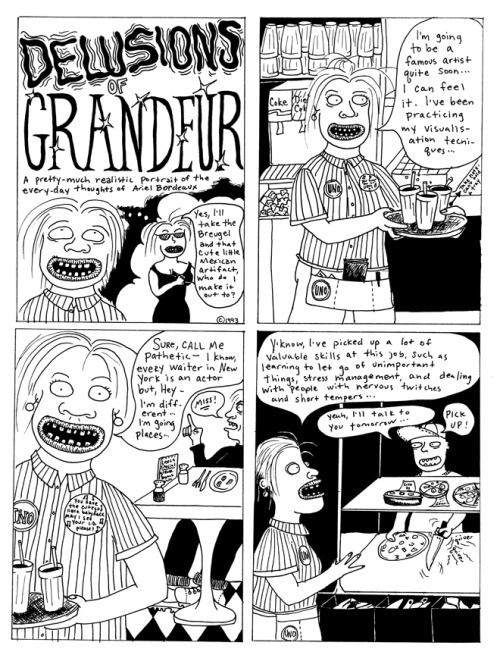
Ariel Bordeaux: Yeah, the reception for No Love Lost was pretty abysmal. Oh, and since we were talking about being compared to Julie Doucet, when I got the Drawn and Quarterly job to write the book, I was given the advice to pimp out my style with some Julie Doucet stylistic tricks, so I did make this awkward attempt to ape her style for that book. I think I may have gotten a couple okay reviews, but what sticks in my mind is it got raked over the coals in the Comics Journal. It just triggered my self-hatred. I tried to fool myself into thinking it didn’t affect me, but it stung, and I harbored a pretty serious deep shame about that book. The thing that occurs to me now, so many years later, is that if that book could have reached an audience of middle school girls and young women, it could have changed the course of my life.
Anna Sellheim: Because women that read your book in middle school really were the ones that reached out to praise the book years later?
Ariel Bordeaux: Exactly.
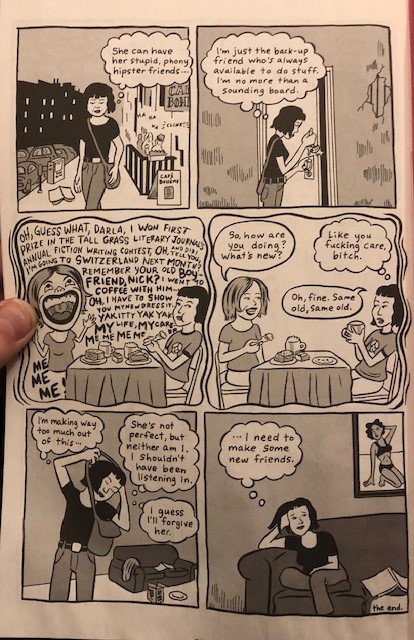
Anna Sellheim: When you get feedback for your work over the course of your career, who is reaching out to you? What are they responding to in your work specifically?
Ariel Bordeaux: Mostly it’s been either people I used to correspond with back in the zine and minicomic pen pal days of the 1990s, and other people that read Deep Girl back then – a mixed gender audience. With No Love Lost, it’s been almost exclusively women who had read it when they were middle or high school age. Most comments have had to do with my stuff being relatable, or funny and feminist. I was invited to speak to a group of high school kids taking a seminar class on feminism at Brown this past summer, that was cool.
Anna Sellheim: You’ve taught classes as well as done guest lectures – what material do you tend to cover?
Ariel Bordeaux: I’ll show some samples from James Kochalka’s Sketchbook Diaries, some John Porcellino, Vanessa Davis, MariNaomi, Lauren Weinstein, Chris Ware to name a few, and a hodgepodge of historical comics. I use some of Lynda Barry’s writing exercises – her “Two Questions” piece is one I like to introduce early: the questions are, “Is this good?” or “Does this suck?” — which is about how those questions can stifle your creativity. Basically, I start with autobio and some short four-panel comics and gradually build up to different ways to approach storytelling and completing a minicomic.
Anna Sellheim: When you were my thesis advisor at CCS (second-year students pick a professional cartoonist to help guide them through their thesis) you described yourself as the “positive comics aunt.” You did a floppy series for Fantagraphics with your husband Rick Altergott, Raisin Pie. You gave me the entire series, and your portion was really lovely. Rick’s wasn’t really my jam, but it obviously holds merit as well. In the back of that book, you said you were taking a break from comics to have your son. How long of a break had you planned and how long did it actually last?
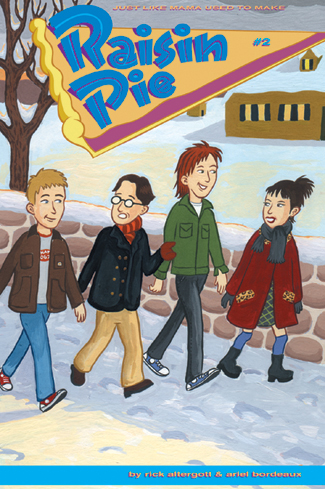
Ariel Bordeaux: I didn’t really have a clue how things would go, so I had no plan. As it turned out, I was inspired by new motherhood, and wanted to continue making comics. For a little while, I had the fantasy of doing a weekly or monthly strip, hopefully find some website that would pay – but that idea died quickly once I had to find a regular job. So when Eddie started preschool, I applied to the Center for Cartoon Studies as a way to give myself the motivation to work on something more ambitious.
Anna Sellheim: And James Sturm, the head of the school, was kind of taken aback by that right? In that you were already established and had a family and a full time job in another state. So you were given a different curriculum — can you go into that briefly?
Ariel Bordeaux: Yeah, James got it that I needed structure, and wanted to earn an MFA in order to qualify to teach, so the school made a long-distance arrangement with me which was essentially that I would do two years of the second year of the program (two “thesis” years), but highly adjusted to my circumstances.
Anna Sellheim: I am a CCS alum myself, and I have read your thesis, Clutter. I, along with a few other students, think it’s the best book to come out of CCS, at least when we read it in 2015. I did a presentation on it specifically because of its distinctly female perspective. I was craving top notch women-created-autobio . What have you done with your thesis? Have you tried publishing it?
Ariel Bordeaux: I think I submitted it to three publishers. I was disappointed that I couldn’t get any response from the two publishers I had worked with before, but I did receive feedback from one, who was willing to look at it again if I worked on it more – which has been an extremely slow process.
Anna Sellheim: Can you delve into that a bit? Your insecurities and feelings and how they’ve affected your work and career? Do you feel like the sexism you’ve experienced has played into your self-image?
Ariel Bordeaux: Oh, God, yes. Well, okay, but I want to back up a little here. We’ve been talking about sexism quite a bit, which has played into my self-image and comics career, but there’s a flip side of that too. For one, I was playing into it and enjoying the attention. For example, I was at a comic con in the mid-nineties, and this guy drew me from across the room. By way of introduction, he then came over and handed me the drawing – and in the drawing I’m holding my shirt up, exposing bare breasts. It was famous underground artist Spain, so I had that mix of ‘what the fuck?’ and ‘Oh my God, it’s Spain!’. I proudly printed that drawing on the inside cover of Deep Girl #5. So, okay, clear sexism – but also, what fun! Getting back to insecurities and self-image, on the positive side, of course it’s great grist for my mill, and a therapeutic process to make comics about. On the not-so-great side, I know I’ve been my own worst enemy, holding myself back from pursuing opportunities, second-guessing my work and abandoning projects. I could probably go on for quite a while unpacking how sexism has played into my self-image, but what comes to mind first is that I’ve spent so much of my life trying to please and perform – to be pretty, to make my art pretty, to be funny and charming – not too gross and crazy, but a little gross and crazy to encourage sexual attention – to be cool and professional in the workplace, but not so robotic I lose my soul, and on and on – and it’s just exhausting. The more I’ve been able to let go of all that and say “fuck it, I’m just gonna be myself”, the better my self-image has gotten.
Anna Sellheim: I totally relate to this. When I was younger, I craved male attention and therefore if I got it, even if it was on the sexist side, as long as I felt safe I saw it as a positive. I can see with any successful autobio, including yours, that there’s a balance of genuine vulnerability along with portraying a self-image that the author is comfortable with. Shitty autobio tends to be done by people that are too focused on their image and portray themselves with no authenticity. The most relevant example of your work that relates to this would probably be Jeff: The Boy I Was Infatuated With or any of the stories where you try to figure your insecurities about your appearance.
Ariel Bordeaux: Right, you have to balance pouring your soul on the page with self-protection, somehow. Tune into and trust your gut instincts. I just remembered, when I was working on that Jeff story, I was telling a friend about how there was a gross thing that happened that I had to leave out of the story. My friend was really putting the pressure on to pry the juicy details out of me, and insisting I had to put everything in. That gross thing was super embarrassing, and there was no way I was telling him about it, or drawing it. I’m kind of impressed by my younger self, that I held my ground on that.
Anna Sellheim: Do you feel like the break you took to raise your son affected the trajectory of your career?
Ariel Bordeaux: Very much so. The year before Eddie was born, between 2005 – 2006 I was crazy busy as a freelancer, and made more money from comics – thanks to a gig for a textbook company – than I had at any other time. I couldn’t keep up that pace with an infant. I never completely stopped making comics, I just couldn’t hustle and try to market myself. I was hoping to revive the comics career thing after CCS, but once I graduated and didn’t have the support and structure of the school, all the wind went out of my sails.
Anna Sellheim: You’ve been producing way more in the last few years than when I first met you in 2015. Can you talk about what work you do now and your reasons behind making them?
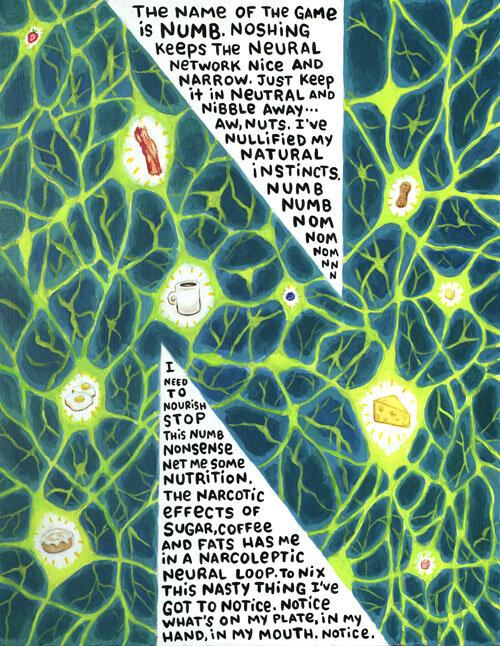
Ariel Bordeaux: Sure, I did a big project called Gluttony for a fine art show on the theme of animals, which is eight large-ish paintings spelling out the word gluttony on the topic of feeling shitty about eating animals. I’ve joined a local collaborative gallery, so I’ve also been doing some paintings to show there, just trying different still object type things. After years of only doing ink with digital coloring, I had been really missing working with paint and color. And for the past year and a half or so, with a big break, I’ve been doing daily diary comics.
Anna Sellheim: The dailies are different from your normal autobio work. Is there a different method, internal process, or feeling between your dailies and your more refined autobio?
Ariel Bordeaux: Yes, I have to do them so quickly, the process feels a lot more intuitive, and also I just can’t endlessly tinker like I usually would, so it forces me to be less precious. I tried drawing with felt tip pen for a while, but it was too time-consuming, so I just leave them as pencil sketches.
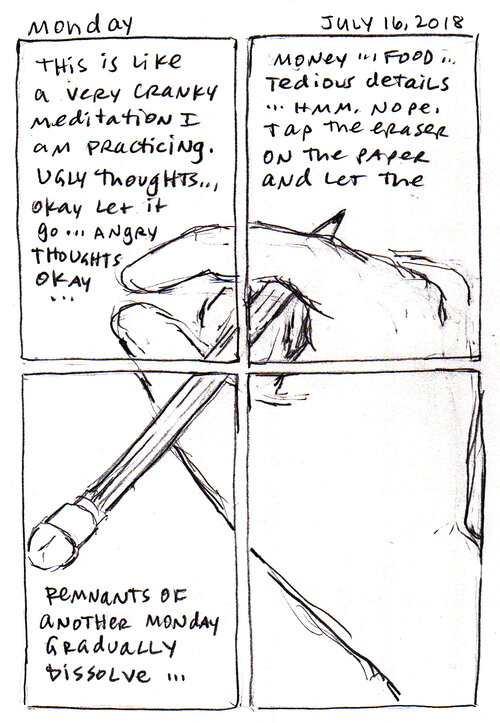
Anna Sellheim: You just created a website and Patreon. Would you mind plugging those?
Ariel Bordeaux: Yes, of course! My website (arielbcomics.com) has some sample pages from my Clutter thesis, as well as Deep Girl and more recent stuff, and I post my daily diary comics on Patreon (patreon.com/arielbordeaux), which you can subscribe to for $3.00 a month. You can also follow me on instagram (@arielbordeaux), where I post some dailies sporadically.
Anna Sellheim: You’re the best, thanks for letting me interview you!
Ariel Bordeaux: Thanks so much, Anna!
SOLRAD is made possible by the generous donations of readers like you. Support our Patreon campaign, or make a tax-deductible donation to our publisher, Fieldmouse Press, today.

Leave a Reply